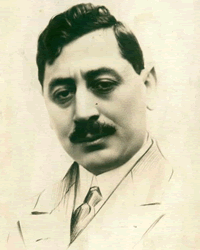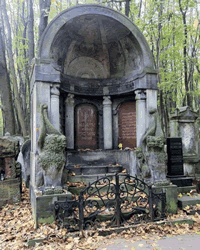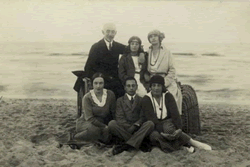A Jewish festival in a town without Jews
By David Mazower
BBC World Service
7 December 2014
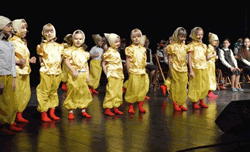
Of the 50,000 citizens in the Polish town of Kutno, not one is Jewish - yet it staged perhaps the most impressive concert of Jewish music I've ever heard.
The performers were all children from schools in the town, the youngest no more than six or seven.
They belted out old hits in Yiddish and Hebrew with a fluency and stage presence that few adult performers could match.
The concert was the finale of an ambitious festival of Jewish culture that the town has held since 1993.
So why does it happen? The short answer is that my great-grandfather was born there.
There's a long answer too, but we'll come on to that.
My great-grandfather, Sholem Asch, was born in Kutno in 1880 in a one-storey wooden house teeming with children, and a yard full of livestock that his father traded.

He moved to Warsaw, then Paris and New York, and became one of the most famous Jewish writers of the 1920s and 30s.
He left Kutno far behind, but the Jewish community he grew up in - with its beggars, traders, butchers, rabbis, prostitutes and assorted schemers and dreamers - all found a kind of immortality in his stories and plays.
That world was swept away in World War Two.
Kutno's experience was typical. In one day the entire Jewish community - 8,000 people - was marched at gunpoint to the grounds of a deserted factory at the edge of town.
They spent two years in filthy, overcrowded conditions, with many dying of disease, hunger and cold, before being murdered in gas vans at Chelmno death camp.
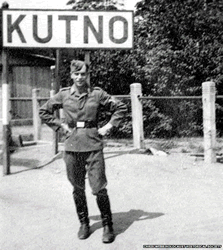
A German soldier in Kutno during World War Two
When the war ended, Kutno, like so many other towns and cities across Poland, essentially started over again, learning to function without its Jewish tailors, shoemakers, lawyers and merchants.
A town with a hole at its heart.

Asch's play God Of Vengeance, set in a brothel in Poland, is being performed in Yiddish in Warsaw
Polish attitudes to the country's Jewish past are complex. There's plenty of lingering anti-Semitism, a kind of kitsch theme park nostalgia, pride in Poles who saved Jews during the war, and guilt about those who collaborated.
To complicate the picture further, there is a deep-rooted conviction that Poles themselves are victims of a turbulent history.
But even that's not the whole story.
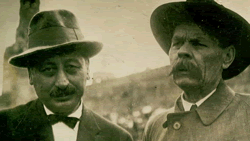
Sholem Asch (left), with the Russian writer Maxim Gorky in Moscow in the 1920s
Something else has emerged in the last 20 years: a growing number of Poles who feel profound loss about the Jewish nation that vanished from their midst.
I came across some of them strolling in Warsaw's vast Jewish cemetery.
They were buying brightly-coloured memorial lanterns to place on graves of people they had no personal connection with, but wanted to honour and remember.
As I stood in front of the large mausoleum to Yitskhok Leybush Peretz, a giant of Yiddish literature, I noticed a glamorous young couple peering at it.
She had thigh-high leather boots, bright red lipstick, an elegant cape.
He had cheekbones to rival Rudolf Nureyev, a natty silk scarf and a trendy beret.
"Do you know who's buried here?" I asked.
"We're Polish - so of course we know about Peretz," they said. "We just can't read the Yiddish words on the tomb."
That deep respect for a vanished culture has also resulted in a world-class museum that's just opened in the heart of Warsaw's former Jewish quarter.
A beautiful shimmering glass structure, it tells the bittersweet story of the Jews' long love affair with Poland with clear-eyed honesty and real flair.
Those same feelings of curiosity, loss and kinship led a handful of people in Kutno to start up a Jewish festival as Poland emerged from communism in the early 1990s.
As private cafes and general stores began to open up, the town announced its first Sholem Asch Festival, a sign that Kutno was looking west, and engaging with European culture.
The town has come a long way since then.
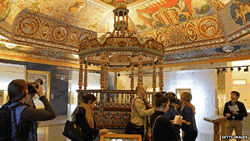
A reconstruction of a wooden synagogue in the new museum
Its new business park is attracting American, German and Chinese companies, and provides jobs for 6,000 locals.
The Sholem Asch Festival has also come a long way. It includes a literary competition on a Jewish theme that attracts hundreds of entries from all over Poland.
There's a local Jewish dance band, theatre performances, and new translations of my great-grandfather's works into Polish.
Poland's rediscovery of its Jewish past started in Warsaw and Krakow, places where Jewish communities re-emerged as the war ended.
It's now spread far beyond the big cities and is growing year by year.
It might not be a mass movement, but as Kutno shows, it's more than just a token effort.
And in a world where bitter sectarian conflicts grab most of the headlines, a Jewish festival in a town with no Jews is surely something worth celebrating.
More from the Magazine
David Mazower remembers more of his family including his cousin Paul. The family patriarch had given all his 10 children an identical watch. Nine of the watches disappeared over time. But at the age of 20, Paul had torn the inner cover off his watch and hidden it inside a window sill in his home in the Polish city of Lodz, before he was deported. He returned as a liberated survivor, persuaded the new occupants of his home to let him in, and retrieved the sliver of metal from its hiding place.
The real Jewish treasures of World War Two
